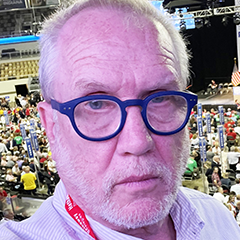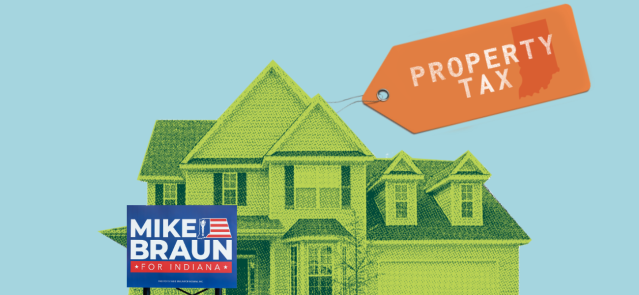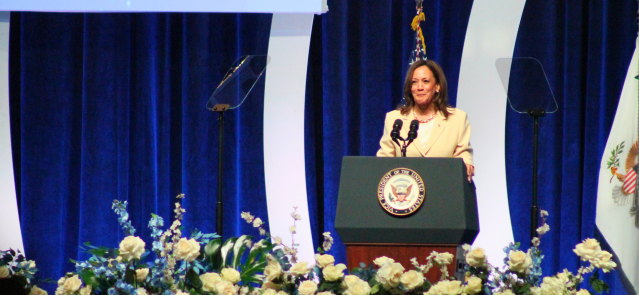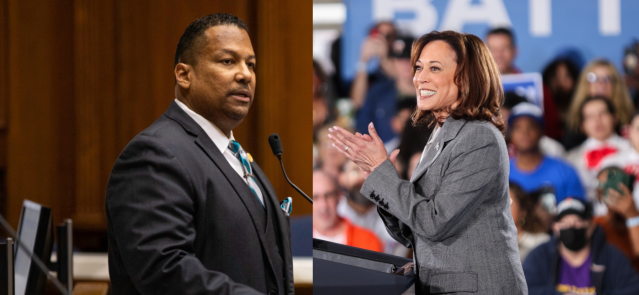Stay ahead of the curve as a political insider with deep policy analysis, daily briefings and policy-shaping tools.
Request a DemoMike Braun on why he wants to be in politics ‘at a level of significance’
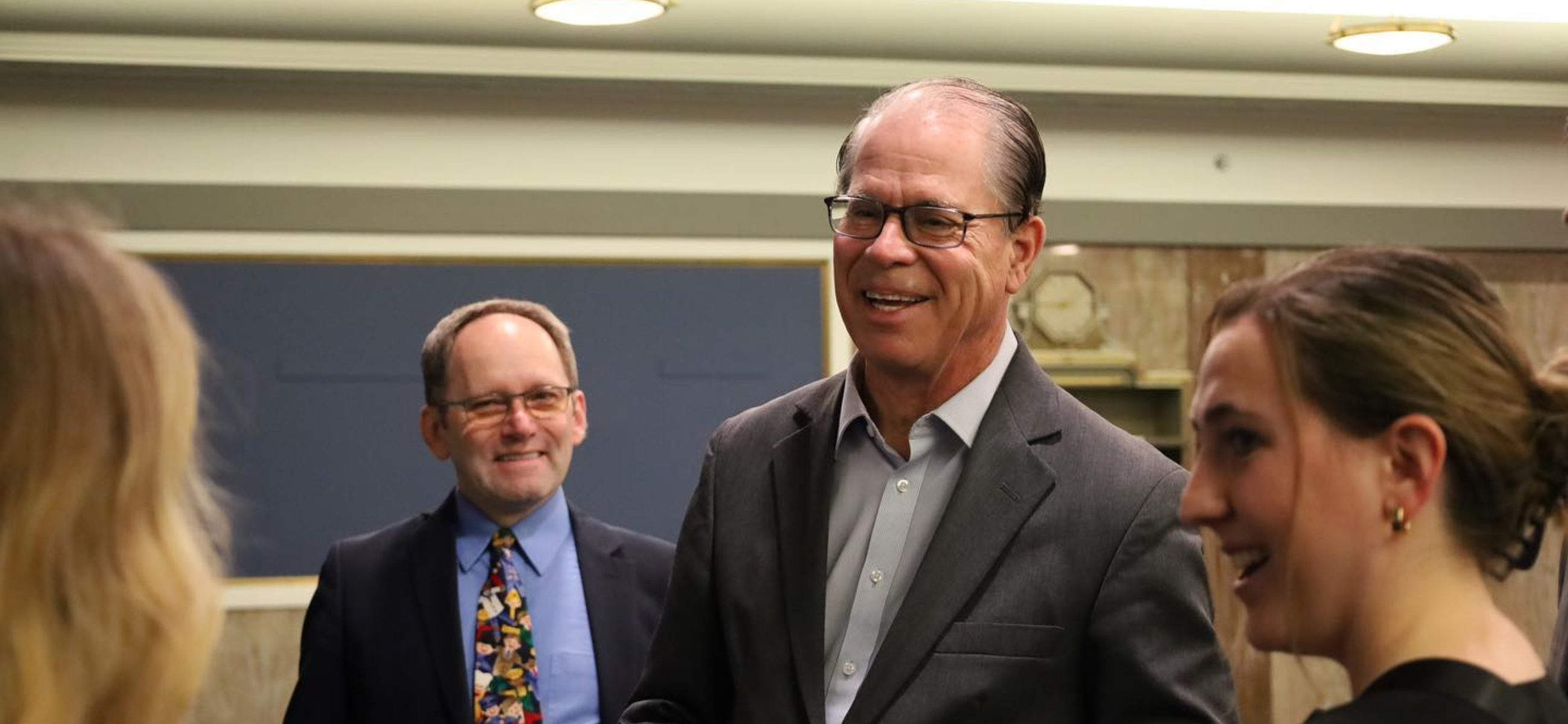
U.S. Sen. Mike Braun speaks with Hoosiers visiting Washington, D.C. (Credit: Office of Sen. Braun)
EDITOR’S NOTE: This is one in a series of profiles of the candidates running for Indiana governor.
JASPER, Ind. — Mike Braun was a former two-term state representative in 2018 when he compared himself to the ultimate “outsider”: President Donald J. Trump.
Braun used that label to defeat two sitting congressmen in a Republican U.S. Senate primary race he had begun with about 1% of support in an internal poll. Then he used five Trump Make America Great Again rallies and $11 million of his own money (and another $20 million from an undisclosed donor) to upset Democratic U.S. Sen. Joe Donnelly.
“Here, we come in as a sitting senator — it’s a much different dynamic in how the political market is going to accept you,” Braun said of his current campaign, as opposed to the one he largely self-funded in 2018. (A conciliation agreement made public in late March revealed that the Federal Election Commission fined Braun’s 2018 campaign $159,000 for failing to properly disclose more than $11 million in transactions from July 2017 through December 2018.)
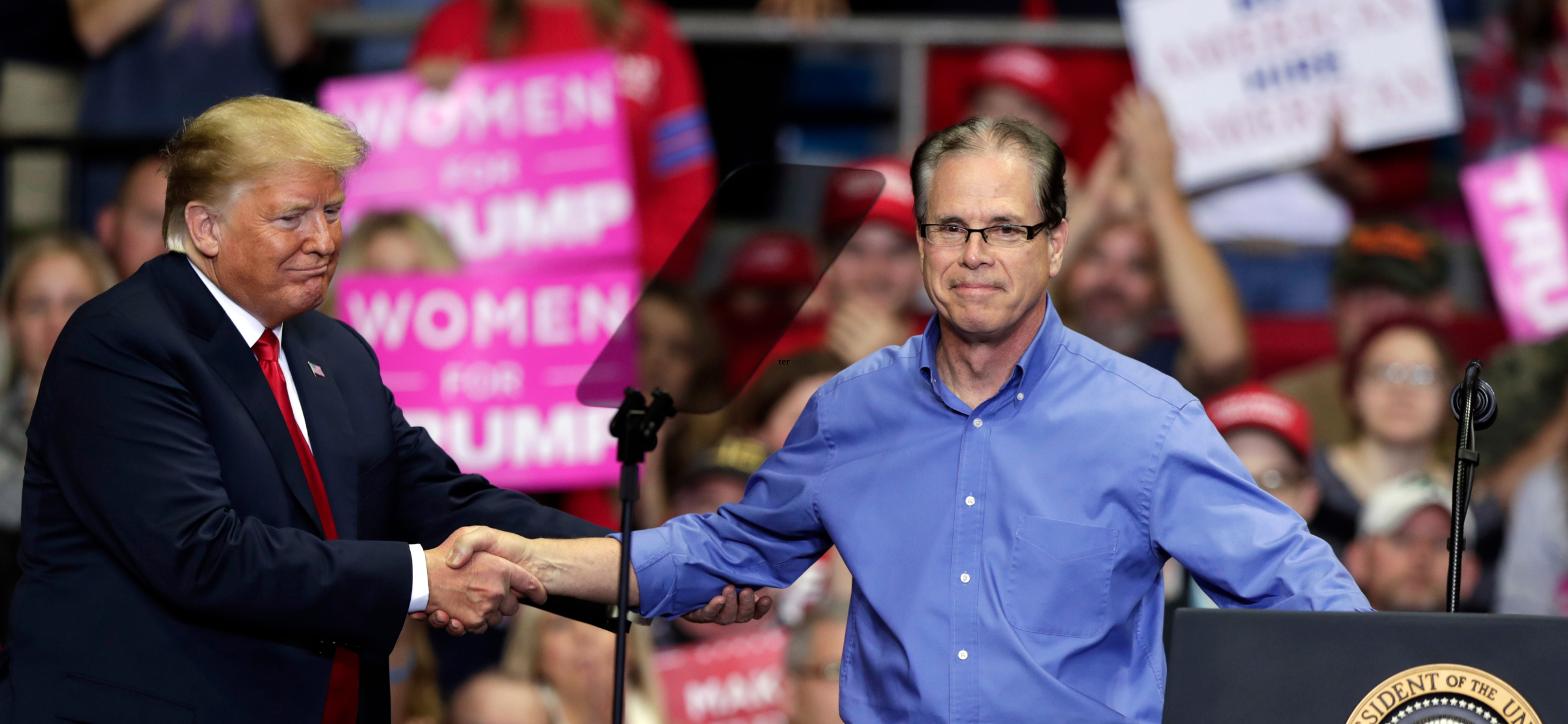
“I think we’re in good shape because we’re fairly solid when you look at the record I’ve got,” he said of the current campaign, in which he repeatedly invites Hoosier voters to examine his record in office. “Politically, this is less of a mystery in terms of what to do. We just need to execute in a similar way to what we did in ’18 and get the message out that will resonate with Hoosiers. I feel confident we’re going to be able to do that.”
Sen. Braun continues to bill himself as the “outsider” — along with former Commerce Secretary Brad Chambers — as he steers through an unprecedented six-person Republican gubernatorial field that also includes Lt. Gov. Suzanne Crouch, businessman Eric Doden, former state Attorney General Curtis Hill and Indianapolis mom Jamie Reitenour.
Normally, Hoosier Republicans coalesce around a single candidate for an open governor’s race, often turning a simple candidacy into a movement. But not this time.
Past Republican nominees and governors were not outsiders — they were ultimate insiders. Edgar Whitcomb sought the office while serving as secretary of state; Doc Bowen as speaker of the House; Richard O. Ristine, Robert Orr and John Mutz as lieutenant governors; Linley Pearson as attorney general; David McIntosh and Mike Pence as congressmen; Mitch Daniels as an outgoing White House budget director; and Eric Holcomb as a former aide to Daniels, U.S. Rep. John Hostettler and U.S. Sen. Dan Coats (before becoming a state GOP chair and then lieutenant governor).
Toward the end of the first homestretch debate at the Carmel Palladium on March 11, Hill wondered why Braun was seeking the governor’s office if his one term in the U.S. Senate had been so successful.
“I thought he was very well equipped for the job,” Hill said. “He talks about how tough it is in D.C. I want him to go back and continue the fight; he gave up the fight. Will he give up the fight as governor?”
Braun responded, “I spent 37 years building a little scrappy business into a regional, national and international company. And that is what I ran for Senate on. It resonated overwhelmingly. If you like me as your senator, you’ll like me better as governor.”

Throughout Indiana history, former governors — from Oliver P. Morton to Evan Bayh — found career-end refuge in the U.S. Senate. Braun is doing it in reverse.
“You know why?” he asked in his unassuming office at his company Meyer Distributing in Jasper. “Because they’re from the farm system of politics. The people who got done being governor just weren’t done with politics. They wanted to continue. My blessing is I did something in the real world first before I decided to get into politics at a level of significance.”
Asked if he is more of an executive than a legislator, Braun responded, “I feel I’m good at both because legislatively I knew what to get done as a legislator. I passed a unique regional authority bill that helped us down here on a road project we talked about for 40 years in the abstract. To me, if you’re an entrepreneur, you know how to get from here to there.”
During the Carmel debate, Braun called himself the “most fiscally conservative” Republican and a freshman who has been honored by independent groups for passing legislation. Chambers reminded him: “You’ve been in the Senate for an additional $7 trillion to $9 trillion in borrowing.”
Asked if he would like to make a rebuttal, Braun said, “I think I’ve got one,” while the audience laughed.
Braun is proud of his Senate record. “I base that mostly upon all the hard work invested as a senator, but a record that is generally resonating with Hoosiers and the fact that I visit all 92 counties each year,” he said. “Something you probably aren’t aware of, but we recently announced we’ve completed 11,000 cases for Hoosiers. We did that on behalf of veterans, immigration, Social Security and the whole spectrum of how you can get entangled with the federal government. That is one of the proudest parts of being a U.S. senator.
“It’s very important for anyone who wants to lead our state [that they’d] better be there with a track record,” he said at the Carmel debate. “You won’t have to figure out what they might do when they say they want to aspire to something like this. You need to be willing to flesh out those ideas. Of anyone on the stage here, I have the most recent track record on what’s happened, when you have to vote, what you’re really for, not what you say you’re going to be for.”
“I think when [Braun] talks about being a proven conservative, he’s served in the U.S. Senate for six years and has votes that can reaffirm that,” Laura Merrifield Wilson, an associate professor in the History & Political Science department at the University of Indianapolis, told State Affairs. “He had been in the General Assembly before that and could point to certain things. That’s going to help especially with your Republican primary in the state of Indiana, which is going to be very heavily conservative.”
Braun and the city of Jasper
To understand what makes Mike Braun tick, you have to travel to Jasper, a small city about an hour northeast of Evansville. “I have been blessed to be raised in a place like Jasper,” he said during the Carmel debate. “It’s a community based on faith, family, freedom and opportunity.”
Braun left Jasper to attend Wabash College and then earned a Master of Business Administration from Harvard University. He said many of his classmates went to Wall Street or Silicon Valley, but he headed back home. He bought what he calls a “hardscrabble” company — Meyer Body — and built it into a sprawling 1,500-employee national enterprise that distributes various products, from auto parts to industrial supplies.
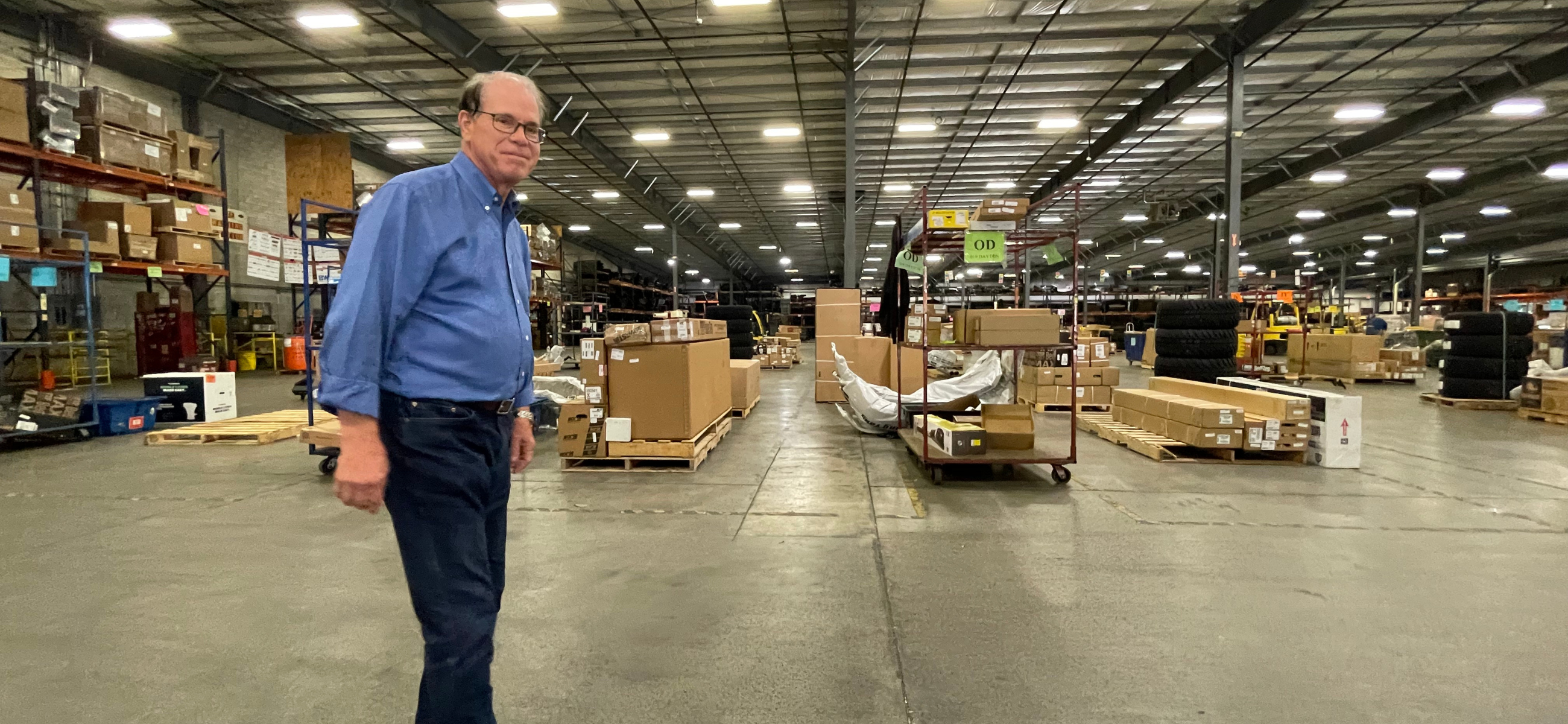
“There’s no substitute about seeing the context of where you’re coming from,” the 70-year-old said last November during a walking tour of this 270,000-square-foot complex. “My major piece of work — you’re looking at it right here.”
In Hoosier politics, a candidate for governor most likely points to his public service record, which in Braun’s case is his 10 years on the local school board, three years in the Indiana House and five-plus years in the U.S. Senate. But he attributes much of his policy underpinnings to the seven acres in Jasper that are home to Meyer Distributing. It is a beehive of activity, with beeping forklifts and transporters shifting and loading product onto tractor-trailers while Aerosmith rock music blares in the background.
It was here 15 years ago where he pursued a new path toward providing more cost-effective health care options for his employees that has transformed his viewpoint on commodity-draining states and private industries. “I fixed health care in my own business, have healthier employees, cut costs 15 years ago, created health care consumers out of my employees and know some of the things I can do for coverage of our own state employees,” he said.
“We’ve got one of the highest health care costs of any state and some of the poorest health care outcomes,” Braun added.
Will that translate to 6.8 million Hoosiers? Can you take those fundamental building blocks on health coverage and bring them to the masses?
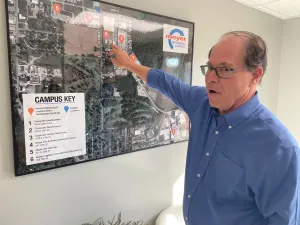
“Sure, you can,” he responded. “That’s owning your own health care and well-being. That’s basically what I did here. I gave the best tools to my employees to do that. I put skin in the game on their minor health care to where they shop around for the small stuff, and they’ve got the best coverage when they get critically ill or have a bad accident. Insurance companies told me all of that. They were making so much money on our plan back then I decided to self-insure and basically solved health care as most companies would love to do, but had to be entrepreneurial. I just basically took what the insurance companies told me, saw how much money they were making covering my business, created it as a cost center and not a profit center and that’s how I fixed things.”
What would a Gov. Mike Braun administration look like?
“What I’ll bring to bear as the governor will be someone who will be entrepreneurial politically,” Braun said. “To me, if you’re a good entrepreneur, politics is easier than building a business. It’s just got tighter compression in terms of the political hurdles you need to jump.”
On his campaign website, Braun expresses optimism about Indiana’s future and says his concerns for the next generation’s welfare are driving his run for governor. Having served Hoosiers in Washington, he believes that solutions to the state’s issues lie locally, not with “special interests and career politicians in D.C.”
Braun has laid out a 12-point agenda that includes growing Hoosier jobs and the economy; improving education; implementing affordable health care; embracing reliable, affordable and clean energy; preserving agriculture; and cutting taxes while reducing the size of government.
His campaign website also addresses hot-button issues:
- “Put kids first” by “making sure divisive theories like critical race theory or discussions about sexual orientation and gender identity have no place in our public schools.”
- “Protect parental rights”: He will fight to “protect the rights of parents to shield their children from divisive ideologies by ensuring parents have transparent access and meaningful input on curriculum and materials in our schools.”
- “Stand up to woke corporations”: He says, “ESG [environmental, social and governance] puts investors and retirees at financial risk and will have no place in the Indiana state government.”
- “Pro-life means pro-family”: “State lawmakers must work to ensure the gains we have made to protect life are secured and strengthened, while working to help mothers and their infants receive the care and social support they deserve to ensure a healthy start to life.”
- “Standing with law enforcement”: He vows “to make sure the justice system is not failing them [law enforcement] by refusing to detain dangerous criminals, manipulating the bail system, and intentionally refusing to enforce laws based on a political ideology.”
- “Securing our southern border”: Braun explains, “Joe Biden and the left have created a humanitarian and national security crisis on our southern border. [I] will work to fund solutions that keep criminals and drugs, like fentanyl, from entering our country.”
- “Defend our constitutional rights”: “The rights of law-abiding gun owners, the freedom to practice our religion, and the rights of parents to protect their children from leftist ideology are under attack.” He says he “will never waver when it comes to defending every Hoosier’s rights to life, liberty, and the pursuit of happiness.”
- “Election security and reform”: “The right of Americans to cast their vote in fair and secure elections is essential to the survival of our Republic. Hoosiers must trust that our elections are free from fraud and guarantee that every legal vote is counted accurately.”
- “No more mandates or lockdowns”: “The lockdowns during the COVID-19 pandemic were a disaster for our state and led to business closures, job losses, mental health issues, learning loss, and still failed to protect the most vulnerable. As Governor, Mike Braun will never lockdown our state, mandate masks for our kids, or tell someone their job or business is not essential.”
At the Palladium on March 11, Braun added that the government “came up with the term ‘you’re essential; you’re not essential’” during the COVID-19 pandemic. “I never thought that would happen in our own Hoosier State,” he said. “When you have that type of bureaucratic determination, try to explain that to my wife and all the other merchants in downtown Jasper. They were out of business for a long time. You never know when it’s going to creep into your own state. It was very disappointing.”
Endorsed by Trump
Braun possesses one important element in his primary race: the imprimatur of Donald Trump. “I can tell you that every one of my opponents would have loved to have the endorsement in a state like Indiana,” he said in his Jasper office.
When Trump endorsed Braun, the former president was facing 91 criminal charges in two federal jurisdictions and two in Manhattan and Georgia (since reduced to 88 when three charges were dropped in Atlanta).
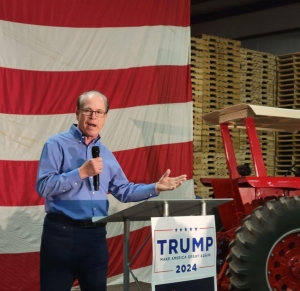
“There’s a political intertwining,” Braun said of the charges facing Trump, who the senator has twice voted to acquit during Senate impeachment trials. Following his 2021 acquittal vote, Braun said, “The riot on January 6th was horrific and should be universally condemned, and while I listened to both President Trump’s defense and the House Managers’ arguments, I believe it is unconstitutional to hold a trial to remove a former President from an office he no longer holds and feel a vote to convict would have deep negative implications for the First Amendment and due process.”
“Whether those indictments get parlayed into a conviction, I’m just extrapolating what I see Republican primary voters are doing,” he said. “I don’t think that makes much difference.”
In the days leading up to Jan. 6, 2021, Sen. Braun was supportive of efforts to challenge Electoral College certification. But after the Trump-inspired mob overran the U.S. Capitol, assaulting more than 150 cops while seeking to hunt down Vice President Mike Pence, Braun reversed course, saying he “didn’t feel comfortable with today’s events.” He said election integrity is “still a valid issue.”
Since Jan. 6, Trump has talked about nullifying the U.S. Constitution and called for the execution of the outgoing chairman of the Joint Chiefs of Staff, Gen. Mark Milley. Does that type of rhetoric concern Braun?
“Obviously, that stuff is not the stuff I would put out there,” he responded during the November tour of his company. “I think that hurts rather than helps the cause because it further polarizes the people that might even like his policies. That’s a difference in approach. I respect everyone’s ability on how they’re going to sell themselves. I would stick on looking at the record in terms of the way it was pre-COVID, and the stuff you can’t change, I don’t know really what the point would be to further talk about it, because you can’t fix it. That toothpaste is out of the tube.”
Wilson of the University of Indianapolis said of Braun: “He’s been able to effectively align himself with Donald Trump. He did that back in 2018, in the Republican primary for U.S. Senate against Todd Rokita and Luke Messer. He was clearly the Trump candidate, and that plays well in Indiana, where Donald Trump has won by 20% in the last few presidential election cycles.”
What type of governor would Braun be?
When Mike Braun served on the local school board, Mitch Daniels was governor. During Braun’s three-year General Assembly tenure, Mike Pence and Eric Holcomb were governors. What did he glean from their leadership styles?
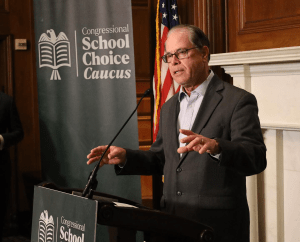
“I’ll be able to distill best practices,” he said. “Look what Mitch Daniels did. He came in 2004, he inherited a budget that was in the red that had been run recently by Democrats. So he had to get the state’s financial cash flowing. And then you look at what he did when he started to address issues. We are the ‘Crossroads of America’ and we weren’t even funding roads the right way. Almost every penny of the fuel tax was being spent on other stuff. He started fixing things that would have been most apparent that needed to be fixed.”
Braun noted that Gov. Daniels wasn’t afraid to spend political capital.
“One reason he did that with good leadership, besides the fact that he’s a brilliant mind, was he was also willing to take risks,” Braun said. “If you’re not willing to take risks, you’re going to be in a broad band of mediocracy, whether it’s in business or government. You don’t want to take on too much; you want to leave your neck intact politically and operationally, and he was willing to do that. I think Pence and Holcomb inherited a much better-run state government and have enhanced it in their own ways since then.
“The difference between me and a Pence or a Holcomb would be [that] I spent my time in the trenches of building a business from scratch,” added Braun, who said he will continue to invite anyone to Jasper on Fridays to talk about issues. “That’s why I took time to show you.”
Statehouse reporter Rory Appleton contributed to this story.
About Braun
- Age: 70
- Hometown: Jasper, Indiana
- Education: Master of Business Administration, Harvard Business School (1978); Wabash College (1976)
- Family: Married to Maureen Braun since 1976, with four children, Ashley, Kristen, Jason and Jeff
- Job: U.S senator from Indiana since 2019
- Work history: Member of the Indiana House of Representatives from the 63rd district from 2014 to 2017; owner of Meyer Distributing (formerly Meyer Body) since the mid-1980s
Read these related stories
- Eric Doden is running from behind but hopes his ‘bold vision’ will propel him forward
- Suzanne Crouch positions herself as a ‘different’ candidate for the voiceless
- Who is Jamie Reitenour? Indianapolis mom mobilized volunteers to make governor’s ballot
- Brad Chambers sells himself as ‘business guy’ to lead Indiana
- Bringing back barnstorming: Curtis Hill and his run for governor
Brian Howey is senior writer and columnist for Howey Politics Indiana/State Affairs. Find Howey on Facebook and X @hwypol.
4 things to know about Braun’s property tax proposal
Sen. Mike Braun, the Republican candidate for Indiana’s governor, released a plan for overhauling property taxes Friday morning that would impact millions of Hoosiers, Indiana schools and local governments. “Nothing is more important than ensuring Hoosiers can afford to live in their homes without being overburdened by rising property taxes driven by rapid inflation in …
Bureau of Motor Vehicles looks to add new rules to Indiana’s driving test
The Bureau of Motor Vehicles wants to amend Indiana’s driving skills test, putting “existing practice” into administrative rule. Indiana already fails drivers who speed, disobey traffic signals and don’t wear a seatbelt, among other violations. Yet the BMV is looking to make the state’s driving skills test more stringent. A proposed rule amendment looks to …
In Indianapolis, Harris says she’s fighting for America’s future
Vice President Kamala Harris, the presumptive Democratic presidential nominee, told a gathering of women of color in Indianapolis on Wednesday that she is fighting for America’s future. She contrasted her vision with another — one she said is “focused on the past.” “Across our nation, we are witnessing a full-on assault on hard-fought, hard-won freedoms …
Indiana Black Legislative Caucus endorses Harris, pledges future support
The Indiana Black Legislative Caucus unanimously voted Wednesday to endorse Vice President Kamala Harris’ presidential run and will look at ways to assist her candidacy, the caucus chair, state Rep. Earl Harris Jr., D-East Chicago, told State Affairs. The caucus is made up of 14 members of the Indiana General Assembly, all of whom are …
